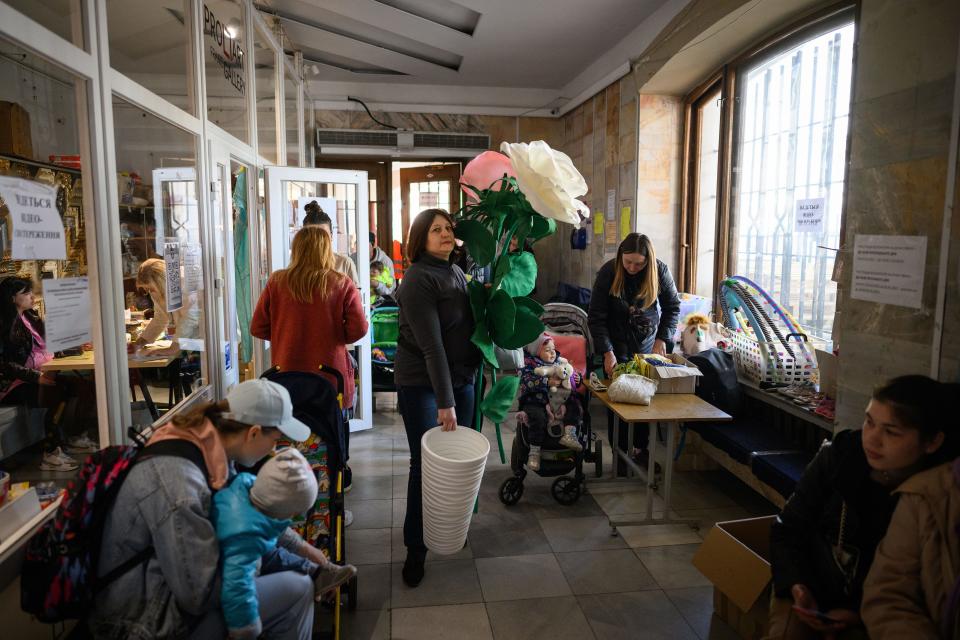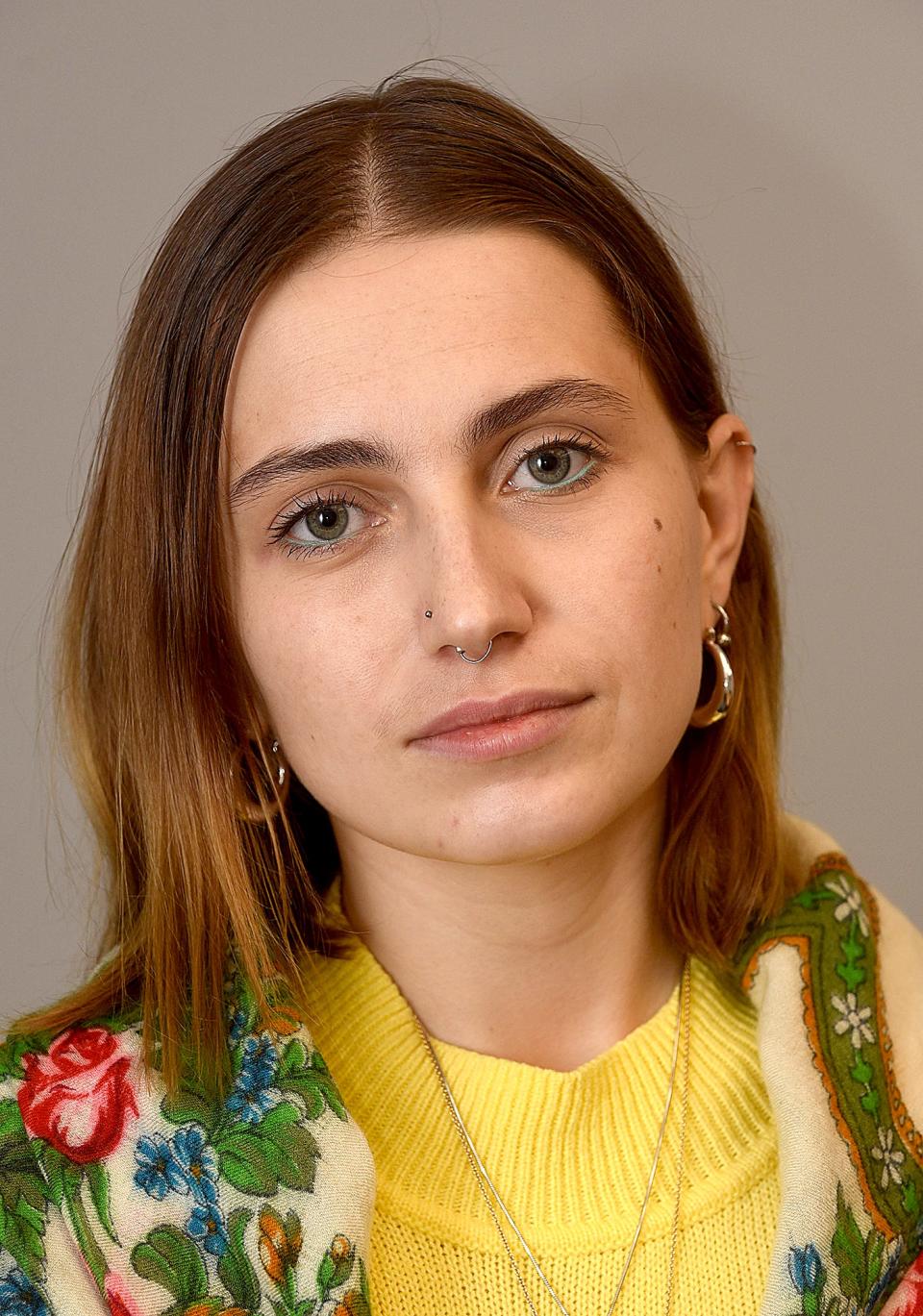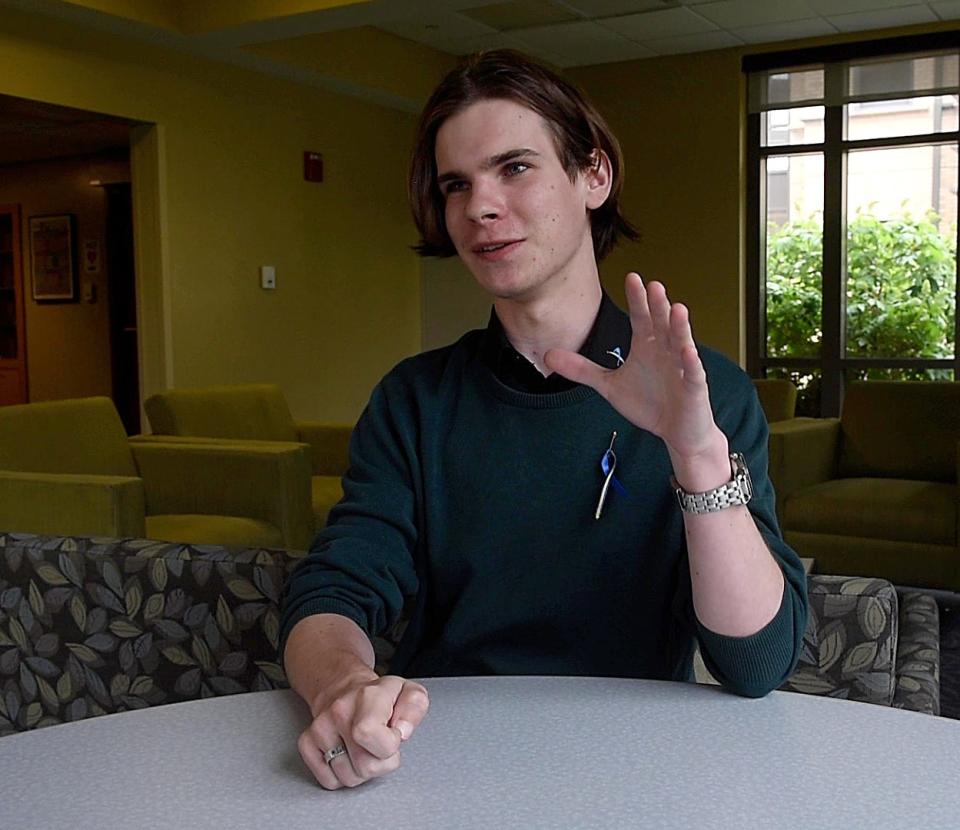MU student Irynka Hromotska, visiting loved ones in Ukraine, describes air raid sirens, journey to Lviv
The nightly air raid sirens took some time to get used to, Irynka Hromotska said.
The University of Missouri graduate student in photojournalism from Ukraine has been in Lviv, her hometown, for nearly two weeks. She responded to questions through voice messages sent over WhatsApp.
"The first couple of nights I was very nervous" about the sirens, Hromotska said.
The sirens caused her to shiver, she said. Making her more nervous was the response of others in Lviv.
"They're already used to it," Hromotska said. "They're more like annoyed with it and they're like, 'Ah, alright, we need to go to the shelter again.' "
She has adjusted, she said.

"It took me some time not to feel too stressed about it," Hromotska said. "Already for a couple of days, I've been more chill about it."
Because there are no flights into Ukraine, she flew into Poland. There, she met up with her mom, dad and sister, among the millions of Ukrainian refugees who have left since the start of the Russian invasion.
It didn't seem unusual to see them in person, she said. She speaks on the phone and has video chats with them every day.
"So we were always in contact," Hromotska said. "It didn't feel weird at all."

From there, she took a train and a bus to the border, crossing on foot. Her partner was there to pick her up.
"I was super, super happy to see him, but it was the same story with him. Since we were talking every day on the phone and we were video chatting all the time, it didn't feel like we didn't see each other in a long time," Hromotska said. "We were even laughing, 'Oh, it seems like the last time we saw each other was this morning.' "
In Lviv, she has reconnected with her grandmothers and granddad, aunts and uncles and friends, she said. She is staying at her partner's parents' house.
Russians haven't damaged much in Lviv, in western Ukraine near the Polish border, she said.
"Thank God, Lviv is fine," Hromotska said. "There are only a couple of places that was really impacted architecturally."
There had been a missile strike at a car repair shop they drive past, she said.
"What struck me was they had this big ad right near the place that said, 'We're already rebuilding and we're coming back soon and glory to Ukraine,' " Hromotska said. "So it was very reassuring and it kind of showed me the strength of the soul of Ukrainian people, you know, like inner strength."
There were people repairing the roof of the building, she said.
She plans to leave Ukraine Sunday and spend an additional five days in Poland, she said.

Vlad Sazhen shares stories from Kharkiv
Though the Ukrainian Army has driven the Russian Army from Kharkiv, eastern Ukraine, the Russians haven't stopped, said Vlad Sazhen.
Sazhen is currently a Ukrainian exchange student at MU, but the university has accepted him as a degree-seeking student so he can stay. Kharkiv is his hometown.
"A lot of people died today in Kharkiv," Sazhen said Thursday, interviewed in Galena Residence Hall. "It was shelled very heavily today."
The dead included a father and his 5-month-old child. The mother also was seriously injured, Sazhen said.
The shells are coming from up to 50 miles away inside Russia, striking Kharkiv, he said.
"The situation is very tough on Kharkiv," Sazhen said. "They are striking Kharkiv."
Sazhen showed video made by his parents on a visit to their Kharkiv apartment, in which explosions can be heard. The windows are taped to prevent them from shattering, he said.
He has a friend serving in the military in Kharkiv.
"He's OK right now," Sazhen said. "He's in a very good mood. He has his PlayStation with him."
Former U.S. Secretary of State Henry Kissinger's comments this week annoyed him, Sazhen said. Kissinger suggested Ukraine cede the Russian-occupied territory in Ukraine to achieve peace.
"I was just mind-blown with what Kissinger said," Sazhen said. Whatever Kissinger did in the past, this is the only thing Ukrainians will know about him, he said.
Ukrainian President Volodymyr Zelenskyy mocked the proposal in a video message, saying it seemed that Kissinger's calendar read 1938 instead of 2022, and that his audience was in Munich, Germany not Davos, Switzerland.
"Great geopoliticians are always unwilling to see ordinary people," Zelenskyy said in the video.
Sazhen said his father suggested Kissinger make his proposal to the injured mother in Kharkiv who lost her husband and child.
Ceding territory to Russia would allow them to continue killing, raping and torturing Ukrainians, Sazhen said.
Ukrainian soldiers in Sievierodonetsk and Lysychansk in the Luhansk region are defending against relentless Russian attacks, Sazhen said. They're the only towns in the region still under Ukrainian control.
"They're basically trying to hold as best as they can until western weapons arrive," Sazhen said.
Western weapons are needed there quickly, but Sazhen said Germany and France are delaying delivery of weapons.
"To me, it's mind-boggling what's happening," Sazhen said.
Not all European countries are unhelpful, he said.
"Poland helps a lot and they've proved to be very good friends," Sazhen said.
Sazhen's parents and sister and his girlfriend, Alina, and her family are in Poltava after leaving Kharkiv.
MU is working to bring Alina to MU as a student and keep Sazhen on campus. It has approved three-year non-residential scholarships for both of them. MU is seeking other funds to help them and other Ukrainian students.
The effort was aided with a fundraiser by the Mizzou Asian Affairs Center and the Columbia Korean Baptist Church, raising $4,350 for the MU Ukrainian Emergency Fund.
“Mizzou’s Asian Affairs Center and our church recognize the sufferings and needs of Ukrainians and decided to fundraise to help them as a united Korean community,” said Chang Lee, pastor at the Columbia Korean Baptist Church.
"I'm very grateful for what people here are doing," Sazhen said.
Roger McKinney is the education reporter for the Tribune. You can reach him at rmckinney@columbiatribune.com or 573-815-1719. He's on Twitter at @rmckinney9.
This article originally appeared on Columbia Daily Tribune: The latest from MU Ukrainian students in Ukraine and on Mizzou campus

